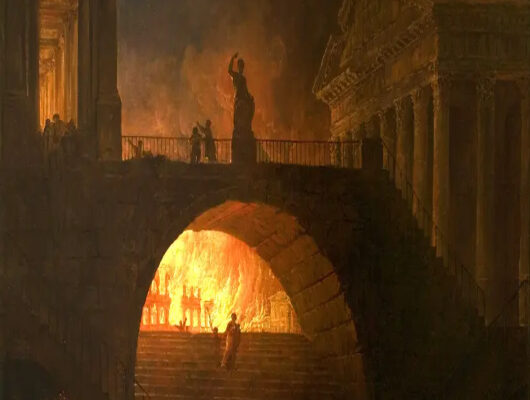Most modern historians are weak. But there is one who stands out above the rest. I can think of no post-Enlightenment historian who better captured why civilizations wither and die than Edward Gibbon.
His 1788 work The Decline and Fall of the Roman Empire describes the process of collapse well, using Rome as the example. I highly recommend this read, even if using the abridged versions.
Here is a brief summary:
The Decline and Fall of the Roman Empire is a monumental work by Edward Gibbon, published in six volumes between 1776 and 1788. Gibbon’s magnum opus provides a comprehensive historical account of the decline and collapse of the Roman Empire, spanning from the height of its power to its eventual fragmentation and fall. The work is considered a masterpiece of historical literature and a key text in the study of the Roman Empire.
Gibbon begins with the reign of Marcus Aurelius in the second century AD and traces the history of the Roman Empire through its various phases, ultimately concluding with the fall of Constantinople in 1453.
You can take his causes of decline from the fall of Rome and apply it to every major national collapse since then.
We can summarize these causes into seven key categories:
- Internal Decay: Gibbon argues that internal decay played a crucial role in Rome’s decline. This included moral decadence, corruption, and a loss of civic virtue among the ruling class.
- Military Challenges: The Roman military, once a formidable force, faced challenges such as overextension, external invasions, and reliance on mercenaries, contributing to its decline.
- Economic Issues: Economic factors, including heavy taxation, inflation, and a reliance on slave labor, are highlighted by Gibbon as contributing to the empire’s decline.
- Religious Factors: Gibbon explores the role of religion in the decline, emphasizing the rise of Christianity and its impact on the traditional Roman values and institutions. This created a breakdown from the original tradition, and a splintering within the foundational values of the state.
- Barbarian Invasions: External pressures from barbarian invasions, particularly by Germanic and Hunnic tribes, are obviously identified as significant contributors to the fall of the Western Roman Empire.
- Administrative Inefficiency: Gibbon critiques the Roman administrative system, pointing to bureaucratic inefficiency, corruption, and a lack of responsiveness to emerging challenges.
- Division of the Empire: The division of the Roman Empire into East and West is seen as a weakening factor, with the Western Roman Empire eventually succumbing to various pressures while the Eastern Roman Empire (Byzantine Empire) persisted for several more centuries.
Any of those sound familiar? I have just recently written on each one of these regarding the current American system:
- Internal Decay: America Is Babylon
- Military Challenges: The Condition Of The U.S. Military: Lying Dog-Faced Pony Soldiers
- Economic Issues: Recognizing The Foundational Crack
- Religious Factors: The Fall Of Christendom And The Great Lie Of The Enlightenment
- Barbarian Invasions: The Ominous Purpose Of Illegal Immigration
- Administrative Inefficiency: Bureaucracy Will Destroy Us
- Division of the Empire: The [Much Needed] Great American Partition
If you didn’t know I was talking about Rome when you read the first list, you’d probably think this article was about the United States. Even the division piece – we don’t have an outright division yet, but the foundation is there, just as it was for Rome.
Remember: this work was written around 1788. When you read the above seven points, you would think it’s a critique of the current American state. But nope, this was Rome circa pre-collapse.
It’s a great work, if you can stomach the sheer amount of content included. Those seven key indicators of decline are helpful to recognize; to properly discern the signs of the times.
The lessons the book provides are phenomenal for extrapolating to future collapses. And pensively, to our own current condition.

A Christian, husband, father, and American dissident. Join him in seeking truth and sipping sweet tea during the collapse of the American Empire. You can find more of his work at hiddendominion.com. Eph. 5:11.






Thank you Kaisar, I will read them this Saturday.
Lotta good content from Kaiser. Great job
I tried to read it as a fourteen year old, but it was beyond my grasp. I do recall though how the Italians welcomed Alaric as a liberator from their Roman tax masters….
For its part America does seem to check a lot of boxes regarding Identity Babylon. Even libs are growing nervous about the near future. For my part I hope to live long enough to see the reality they’ve spent their lives attacking come crashing down on them.
Planet Babylon: https://citizenfitz09.blogspot.com/2024/01/planet-babylon.html
Well written Post…
Also, just in case anyone wants to know..
“WHAT EXACTLY IS THE UNITED NATIONS AGENDA 2030 WHICH IS CURRENTLY BEING ENFORCED GLOBALLY?”, pls visit my blog 👇https://bibleprophecyinaction.blogspot.com/
Your article is another reminder to me of things I should have read, but haven’t. It puts me in mind of the following lines from Edward Young’s ‘Night Thoughts’:
At thirty man suspects himself a fool;
Knows it at forty, and reforms his plan;
At fifty chides his infamous delay,
Pushes his prudent purpose to resolve;
In all the magnanimity of thought
Resolves, and re-resolves: then dies the same.